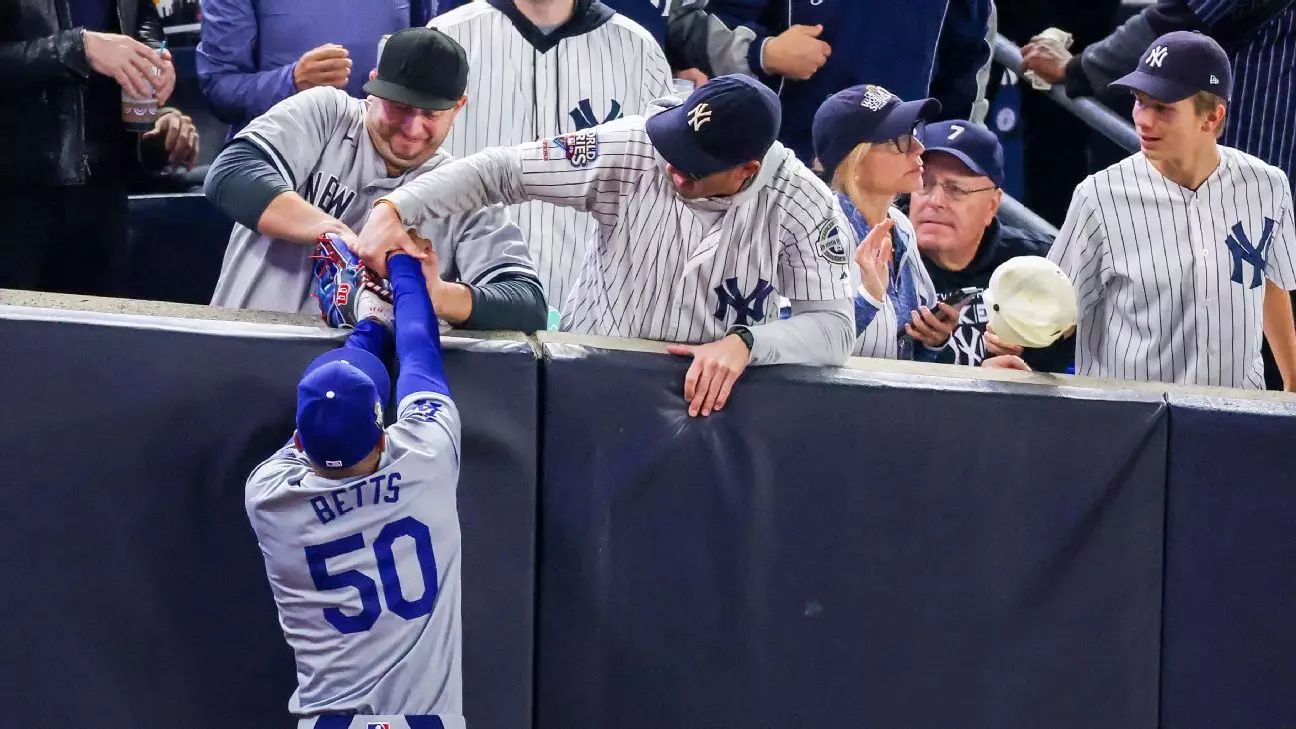In a captivating World Series that has already been filled with high tension and dramatic plays, one incident during Game 4 at Yankee Stadium has left baseball fans and analysts buzzing. The event in question involved a foul ball, a fan’s reckless ambition to snag a piece of the action, and the subsequent fallout that ensued. This incident, rooted in the passionate nature of baseball fandom, opens up a wider conversation about the boundaries between a fan’s enthusiasm and the sanctity of the game.
During the first inning of the game between the New York Yankees and the Los Angeles Dodgers, Gleyber Torres hit a high pop-up that traveled into foul territory. Mookie Betts, the Dodgers‘ right fielder, made a daring leap to catch the ball. However, just as he secured the ball in his glove, Austin Capobianco, a Yankees season ticket holder, attempted to wrest the ball from Betts‘ grasp. Accompanying Capobianco was his friend John Peter, who physically interfered by grabbing Betts‘ non-glove hand. The consequence was immediate; the right-field umpire called fan interference, declaring Torres out and igniting a mixture of outrage and bewilderment in the stands.
This incident raises ethical questions around fan behavior. While many fans adhere to an unspoken code of conduct, there are instances — as seen here — where that boundary is crossed. Capobianco later admitted that he and Peter often jokingly discussed how they would react should a similar situation arise. This notion of „defending“ their area illustrates a troubling mindset where some fans may feel justified in undermining opposing players for the sake of team loyalty.
The reaction from Betts was indicative of a focus on team performance rather than personal grievances. Post-game, he downplayed the incident in favor of discussing the game’s outcome. „We lost. It’s irrelevant,“ he stated, directing attention towards the need for the team to refocus on the series. His comments reflect a professional approach, prioritizing the game over individual moments of spectacle or drama.
However, the psychological and emotional toll of such interference cannot be ignored. What may seem like harmless fan behavior can, in reality, cause frustration and distraction to the players involved. Betts’ calm demeanor post-incident serves as a testament to his professionalism, yet it also demonstrates a larger issue regarding how some fans misconstrue their role in the game’s theater.
Strikingly, the ramifications of this incident extended far beyond the immediate moment. The Dodgers, who were already up by two runs thanks to a two-run homer by Freddie Freeman, found themselves unable to maintain their lead, ultimately losing 11-4 to the Yankees. Rookie pitcher Ben Casparius commented on how the interference „set the tone“ for the match, highlighting that these uncontrolled variables can significantly sway the direction of the game.
For Capobianco and Peter, the aftermath was swift; they were escorted from the park but reassured they could return for the next game. In his post-incident reflections, Capobianco expressed a fleeting recognition of his culpability, admitting, „I know when I’m in the wrong.“ Yet, this sentiment is tinged with a disregard for the broader implications of their actions.
Ultimately, the incident raises critical questions about the nature of fandom. Where does enthusiasm end, and unruliness begin? Fans must navigate this precarious balance; the spirit of the game should encompass appreciation and respect for the players, who dedicate their lives to excellence in sports. While it’s natural for fans to wish to support their team in any way possible, physical interference crosses the line of acceptable behavior.
The 2023 World Series will be remembered for its thrilling moments, but the incident at Yankee Stadium serves as a stark reminder of the potential hazards lurking within the fan experience. As the series progresses, one can only hope that both fans and players find common ground in their mutual love for the game, keeping excitement above all else—without compromising the integrity of play on the field.


Napsat komentář